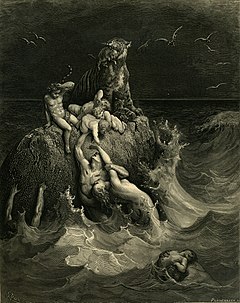
Back الكتاب المقدس والعنف Arabic Gewalt in der Bibel German کتاب مقدس و خشونت FA Bible dan Keganasan Malay A Bíblia e a violência Portuguese 圣经与暴力 Chinese

The Hebrew Bible and the New Testament both contain narratives, poems, and instructions which describe, encourage, command, condemn, reward, punish and regulate violent actions by God,[1] individuals, groups, governments, and nation-states. Among the violent acts referred to are war, human sacrifice, animal sacrifice, murder, rape, genocide, and criminal punishment.[2]: Introduction Violence is defined around four main areas: that which damages the environment, dishonest or oppressive speech, and issues of justice and purity. War is a special category of violence that is addressed in four different ways including pacifism, non-resistance, just war and crusade.
The biblical narrative has a history of interpretation within Abrahamic religions and Western culture that have used the texts for both justification of and opposition to acts of violence.[3] There are a wide variety of views interpreting biblical texts on violence theologically and sociologically. The problem of evil, violence against women, the absence of violence in the story of creation, the presence of Shalom (peace), the nature of Hell, and the emergence of replacement theology are all aspects of these differing views.
- ^ Römer, Thomas (2013). Dark God: Cruelty, Sex, and Violence in the Old Testament (3rd Revised and expanded ed.). New York: Paulist Press. ISBN 978-08-0914796-0.
- ^ Creach, Jerome F. D. (2013). Violence in Scripture: Resources for the Use of Scripture in the Church. Louisville, Kentucky: Westminster John Knox Press. ISBN 978-0-664-23145-3.
- ^ Fletcher, George P.; Olin, Jens David (2008-03-18). Humanity, When Force is Justified and Why. New York, New York: Oxford University Press, Inc. p. 50. ISBN 978-0-19-518308-5.